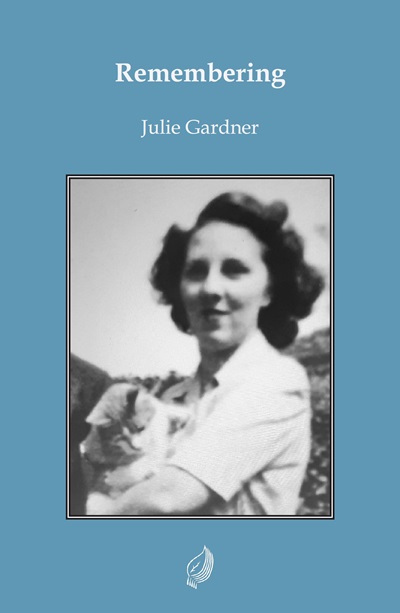Categories

Remembering
ISBN: 9781915434203
Format: Pamphlet, 40 pages,
Available (Published: September 2024)
£7.00
Book details
Remembering includes poems based on the few facts Julie Gardner knows about the early life of her mother, who died suddenly at the age of forty-seven. These poems are fictional yet symphonic in their scope and show how a whole life story can be built up from the simple knowledge of a person’s existence. A second sequence, about Julie’s husband, Arthur, who died in 2008, is very real, raw yet tender and full of blessings.
These poems are written by a grandmother in the hope that her granddaughters will read them and know that she loved and was loved. Read in combination, the stand-alone poems and the two sequences shine with that love.
About the Author
Julie Gardner was born in Coventry. Since then she has lived in Cheshire, Wiltshire, Newark, Bedford, Cambridge, Worcestershire and Leicestershire. She moved to Nottingham in 2016 and loves living in the city. A primary school teacher for over forty years, she retired in 2017 and enrolled on an MA course. She enjoyed it so much she is now working towards a PhD, focussing on the work of Nottingham-born poet, Vicki Feaver.
2 reviews for Remembering
You must be logged in to post a review.



Five Leaves Publishing –
Memorial poetry has a long tradition and for a good reason. It holds the individual human life in the light of the present – the story, voice, and details of each life in its uniqueness. In two sequences Julie Gardner brings the lives of her mother and her own husband into the shared space between reader and poet, letting her imagination play across nursery rhyme, history, unanswered questions and real lives with poetic assurance. She writes with that intelligent lightness which a poet brings, a concentration on the centrality of emotional truth shaped by an exactness in language and form. These poems give us – and their subjects – an enriched presence.
DA Prince
Five Leaves Publishing –
Julie Gardner offers deeply personal insights that elegantly interweave to form emotionally resonant narratives. ‘Remembering’s’ two main sequences, focusing on her mother and her own late husband, guide the reader through a wide emotional range, from sorrow to tenderness, and on to quiet reflection.
Whether in the hope-filled ‘Intermezzo’ or the quietly poignant ‘Embrace’, Gardner compels the reader to follow through each thread. While the individual poems stand on their own, the full impact of themes like time, legacy and love emerges most powerfully through the cumulative flow of the sequences.
Particularly affecting are the poems dedicated to her husband, Arthur, which leave a lasting impression without ever feeling overstated.
And when at first you began to slow,
in my new-found optimism, I believed
it was me who was getting faster.
(‘A New Year’s Resolution’)
The musically inspired titles that follow Gardner’s mother (‘Da Capo’, ‘Rondo’ and ‘Morendo’) add a layer of rhythm and song echoing the cadence of the poems themselves. There is a quiet innocence to the use of ‘Jack and Jill’ within these poems, who we are allowed to follow and imagine into adulthood, lending the reality of the situation yet more gravity the further you lean into the playful, rhyming lilts.
Love and care shape every poem in the pamphlet, which is clear in the call back to the two bookending poems from Arthur Gardner himself (‘Blessings’ and ‘Messages’). This gives the feeling of a gently circular, shared memory we’re revisiting. The moon through the window appears throughout the sequence, becoming the symbol of memories that are at once fleeting and constant, but ever luminous.
What would you say if you could
come and see me now? I think I know.
You’d whisper blessings, show me how
the moon still shines into my room at night.
(‘For Arthur’)
Nathan Fidler